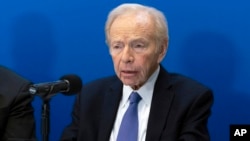Former U.S. Sen. Joe Lieberman of Connecticut, who nearly won the vice presidency on the Democratic ticket with Al Gore in the disputed 2000 election and who almost became Republican John McCain's running mate eight years later, has died, according to a statement issued by his family.
Lieberman died in New York City on Wednesday because of complications from a fall, the statement said. He was 82.
The Democrat-turned-independent was never shy about veering from the party line.
Lieberman's independent streak and especially his needling of Democratic presidential nominee Barack Obama during the 2008 presidential contest rankled many Democrats, the party he aligned with in the Senate. Yet his support for gay rights, civil rights, abortion rights and environmental causes at times won him the praise of many liberals over the years.
Lieberman came tantalizingly close to winning the vice presidency in the contentious 2000 presidential contest that was decided by a 537-vote margin victory for George W. Bush in Florida after a drawn-out recount, legal challenges and a Supreme Court decision. He was the first Jewish candidate on a major party’s presidential ticket and would have been the first Jewish vice president.
He was also the first national Democrat to publicly criticize President Bill Clinton for his extramarital affair with a White House intern.
Lieberman sought the Democratic presidential nomination in 2004 but dropped out after a weak showing in the early primaries. Four years later, he was an independent who was nearly chosen to be McCain’s running mate. He and McCain were close friends who shared hawkish views on military and national security matters.
McCain was leaning strongly toward choosing Lieberman for the ticket as the 2008 GOP convention neared, but he chose Sarah Palin at the last minute after “ferocious” blowback from conservatives over Lieberman’s liberal record, according to Steve Schmidt, who managed McCain’s campaign.
Lieberman generated controversy in 1998 when he scolded Clinton, his friend of many years, for “disgraceful behavior” in an explosive speech on the Senate floor during the height of the scandal over his relationship with Monica Lewinsky. Yet Lieberman later voted against the impeachment of Clinton.
He defended his partisan switches as a matter of conscience, saying he always had the best interests of Connecticut voters at heart. Critics accused him of pursuing narrow self-interest and political expediency.
In announcing his retirement from the Senate in 2013, Lieberman acknowledged that he did “not always fit comfortably into conventional political boxes” and felt his first responsibility was to serve his constituents, state and country, not his political party.
During his final Senate speech, Lieberman urged Congress to look beyond party lines and partisan rancor to break Washington gridlock.
“It requires reaching across the aisle and finding partners from the opposite party,” said Lieberman. “That is what is desperately needed in Washington now.”
Harry Reid, who served as Senate Democratic leader, once said that while he didn’t always agree with the independent-minded Lieberman, he respected him.
“Regardless of our differences, I have never doubted Joe Lieberman’s principles or his patriotism,” Reid said. “And I respect his independent streak, as it stems from strong convictions.”
Privately, some Democrats were often less charitable about Lieberman’s forays across party lines, which they saw as disloyal. He left his party and turned independent after a 2006 Senate primary loss in Connecticut.
Lieberman’s strong support of the Iraq War hurt his statewide popularity. Democrats rejected Lieberman and handed the 2006 primary to a political newcomer and an anti-war candidate, Ned Lamont.
Defying Democratic leaders and friends, Lieberman ran successfully for reelection as an independent and drew support from some Republican allies.
After his rebound reelection in 2006, Lieberman decided to caucus with Democrats in the Senate, who let him head a committee in return because they needed his vote to help keep control of the closely divided chamber.
Despite the decision of Democrats to let him join their caucus as an independent, Lieberman was an enthusiastic backer of McCain in the 2008 presidential contest.
Lieberman’s speech at the 2008 GOP presidential nominating convention criticizing Obama, the Democratic presidential nominee, struck a deep nerve with many Democrats.
Lieberman was known in the Senate for his hawkish foreign policy views, his pro-defense bent and his strong support for environmental causes. He played a key role in the legislation that created the Homeland Security Department.
Lieberman grew up in Stamford, Connecticut, where his father ran a liquor store. Lieberman graduated from Yale University and Yale Law School in New Haven. As Connecticut’s attorney general from 1983 to 1988, he was a strong consumer and environmental advocate. Lieberman vaulted into the Senate by defeating moderate Republican incumbent Lowell Weicker in 1988.
After leaving the Senate in 2013, Lieberman joined a New York City law firm.
He is survived by his wife, Hadassah, and their four children.









